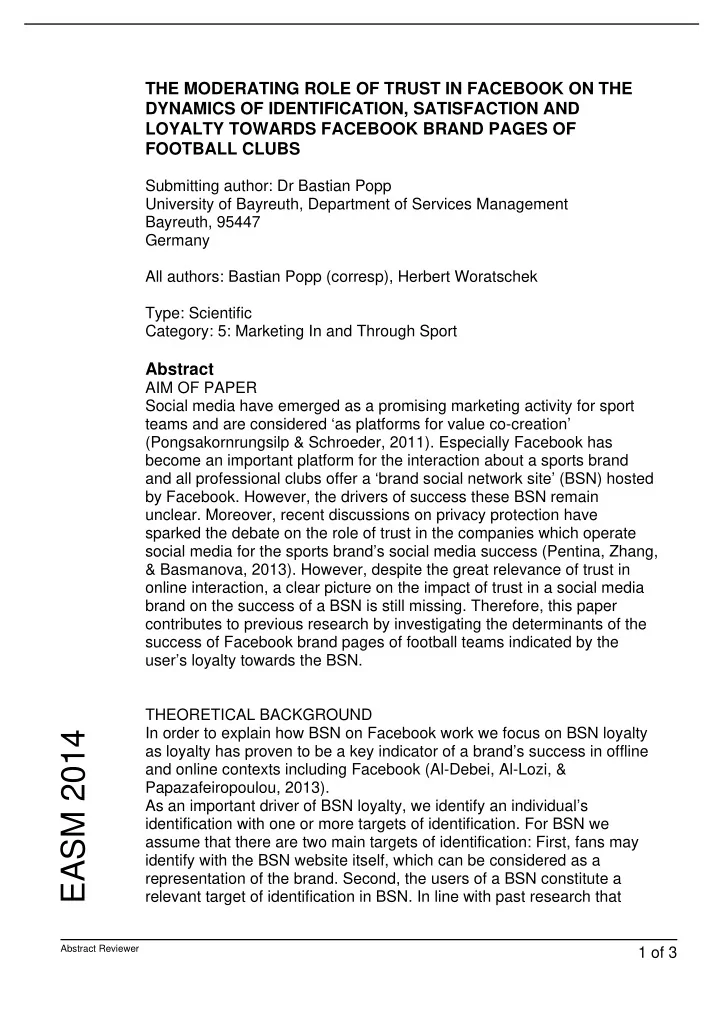

THE MODERATING ROLE OF TRUST IN FACEBOOK ON THE DYNAMICS OF IDENTIFICATION, SATISFACTION AND LOYALTY TOWARDS FACEBOOK BRAND PAGES OF FOOTBALL CLUBS Submitting author: Dr Bastian Popp University of Bayreuth, Department of Services Management Bayreuth, 95447 Germany All authors: Bastian Popp (corresp), Herbert Woratschek Type: Scientific Category: 5: Marketing In and Through Sport Abstract AIM OF PAPER� Social media have emerged as a promising marketing activity for sport teams and are considered ‘as platforms for value co-creation’ (Pongsakornrungsilp & Schroeder, 2011). Especially Facebook has become an important platform for the interaction about a sports brand and all professional clubs offer a ‘brand social network site’ (BSN) hosted by Facebook. However, the drivers of success these BSN remain unclear. Moreover, recent discussions on privacy protection have sparked the debate on the role of trust in the companies which operate social media for the sports brand’s social media success (Pentina, Zhang, & Basmanova, 2013). However, despite the great relevance of trust in online interaction, a clear picture on the impact of trust in a social media brand on the success of a BSN is still missing. Therefore, this paper contributes to previous research by investigating the determinants of the success of Facebook brand pages of football teams indicated by the user’s loyalty towards the BSN. � � � THEORETICAL BACKGROUND� In order to explain how BSN on Facebook work we focus on BSN loyalty EASM 2014 as loyalty has proven to be a key indicator of a brand’s success in offline and online contexts including Facebook (Al-Debei, Al-Lozi, & Papazafeiropoulou, 2013). � As an important driver of BSN loyalty, we identify an individual’s identification with one or more targets of identification. For BSN we assume that there are two main targets of identification: First, fans may identify with the BSN website itself, which can be considered as a representation of the brand. Second, the users of a BSN constitute a relevant target of identification in BSN. In line with past research that Abstract Reviewer 1 of 3
suggests positive effects of identification on loyalty both towards the brand as well as towards closely associated targets of identification, we assume:� H1: �Consumer-BSN identification positively impacts BSN loyalty.� H2: �Consumer identification with BSN users positively impacts BSN loyalty.� The conceptual model incorporates customer satisfaction with the BSN as a determinant of BSN loyalty, because it is recognized as a key driver of loyalty. � H3: �Customer satisfaction with the BSN positively impacts BSN loyalty.� BSN are significantly influenced by the company which operates the social networking site. In light of the recent discussions on privacy concerns we utilize the construct of trust which is commonly defined as willingness to rely on an exchange partner in whom one has confidence (Moorman, Deshpande, & Zaltman, 1993). Trust has proven to be an essential catalyst for establishing and maintaining relationships and we therefore propose:� H4: �Trust in Facebook positively impacts BSN loyalty.� In addition to testing for this direct effect of trust in Facebook on BSN loyalty, we propose that trust in Facebook acts as a moderator of the effects of identification and satisfaction on BSN loyalty: � H5a/b/c:�Trust in Facebook moderates H1, H2, and H3: that is, the relationship is weaker under conditions of low Facebook trust and stronger under conditions of high Facebook trust.� � � METHODOLOGY, RESEARCH DESIGN AND DATA ANALYSIS� � The structural model was tested using an online survey pertaining to the official Facebook pages of all clubs from the German Bundesliga. The sample consisted of 164 Facebook users commenting on at least one club’s Facebook page. PLS path modeling was implemented due to the small sample size and its ability to deal with complex models and interaction terms. � � � RESULTS, DISCUSSION AND IMPLICATIONS� � EASM 2014 The measurement models were checked with regards to construct reliability and discriminant validity. The predictive capacity of the model was strong (R2=63.38%) and increased when the interactions terms were added (R2=65.79%). According to the Cohen (1988) formula which assesses the overall effect size f2 for the interaction the moderator demonstrates a small, but meaningful effect (0.066). � Identification with other BSN users has the strongest impact on BSN loyalty (H1:β=0.405**). Moreover, satisfaction with the BSN (H3:β=0.277**), identification with the BSN (H2:β=0.172**) significantly increase BSN loyalty, whereas trust in Facebook has a Abstract Reviewer 2 of 3
small, but significant effect (H4:β=0.087**). In contrast to our hypotheses we could not confirm the moderating role of trust in Facebook. Rather, we even find a significant negative effect on the relationship between consumer-BSN identification and BSN loyalty (H5a:β=-0.140**).� The contribution of our findings is twofold: First, we illustrate the relevance of different drivers of Facebook brand pages of sport clubs thereby providing a basis for managerial implications. Second, the inclusion of trust in Facebook as a direct and a moderating influence for the first time addresses the influence of the company which operates the social network platform on the relationship between fans and the sports brand. References Al-Debei, M. M., Al-Lozi, E., & Papazafeiropoulou, A. (2013). Why people keep coming back to Facebook: Explaining and predicting continuance participation from an extended theory of planned behaviour perspective. Decision Support Systems, 55(1), 43-54. doi: http://dx.doi.org/10.1016/j.dss.2012.12.032� Cohen, J. (1988). Statistical Power Analysis for the Behavioral Sciences (2 ed.). Hillsdale: Lawrence Erlbaum Associates.� Moorman, C., Deshpande, R., & Zaltman, G. (1993). Factors affecting trust in market research relationships. The Journal of Marketing, 57(1), 81-101. � Pentina, I., Zhang, L., & Basmanova, O. (2013). Antecedents and consequences of trust in a social media brand: A cross-cultural study of Twitter. Computers in Human Behavior, 29(4), 1546-1555. � Pongsakornrungsilp, S., & Schroeder, J. E. (2011). Understanding value co-creation in a co-consuming brand community. Marketing Theory, 11(3), 303-324. doi: 10.1177/1470593111408178 EASM 2014 Abstract Reviewer 3 of 3
Recommend
More recommend